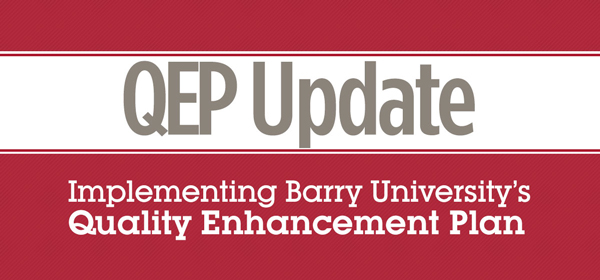|
|

|
Provost Appoints Community Advisory CommitteeBarry University Provost, Dr. John Murray, has appointed a Community Advisory Committee to support the implementation of the Quality Enhancement Plan (QEP). Chaired by Saliha Nelson, vice president of URGENT, Inc., the nine-member committee will provide feedback and recommendations on various aspects of the QEP during its implementation. “The committee will also assist in shaping institutional involvement with the community by offering suggestions and advice,” said University Provost Dr. John Murray. “Committee members will regularly share their knowledge, experience, and expertise with the university.” Other members of the committee include Juan J. Calvo, international partner, Baron Silver Stevens Financial Advisors; Ezra Dieuveille, BLOC (Building Leaders of Character) program coordinator, Gang Alternative; Anthony Grisby, community development program administrator, City of Hollywood; Linsey Harris Smith, area & foundations relations director, Special Olympics Florida; Andrea Ivory, founder & executive director, The Women’s Breast and Heart Initiative; Lynne Kunins, president/CEO, FLIPANY; and Kyle Mullan, high school program coordinator, The Cushman School. |
QEP Website Up and RunningThe QEP website was launched on March 3. Features of the site include an overview of the Quality Enhancement Plan, which is titled “Fostering Personal and Social Responsibility through Experiential Learning,” with an outline of the student learning outcomes. Among resources at the site are journal articles on liberal education, experiential learning, and related topics. Additional resources are downloadable fact sheets on community-based research, experiential learning, and service-learning as well as PSR application forms. |

|
Courses, Co-Curricular Events Get PSR DesignationSo far, five courses and nine co-curricular events have received the PSR (personal and social responsibility) designation. The courses are ENG 111: First-Year Composition, ENG 112: Techniques of Research, ENG 210: Writing about Literature, SOC 200: Perspective Consciousness and Social Justice, and THE 201: Theology: Faiths, Beliefs, and Traditions. The PSR-designated co-curricular events are the College Brides Walk, Community Engagement Fair, Deliberative Dialogue, Freshmen Experience Day, Psychology Research Forum, Science with a Twist (SWAT), SES Research Colloquium, STEM Research Symposium, and the Undergraduate Miniconference. Each course and event meets at least one of the six PSR outcomes of the QEP. In the QEP, personal and social responsibility is defined as “the obligation to strive for excellence, demonstrate integrity, develop competence in ethical reasoning and action, and contribute to the community as local and global citizens.” The PSR outcomes are categorized as (1) Ethical and Moral Reasoning, (2) Engaging Diverse Perspectives, and (3) Community Engagement and Collaboration. Each category contains two specific student learning outcomes. For information on the PSR designation process, contact QEP Director Dr. Glenn Bowen at gbowen@barry.edu. |
All Set for Community Engagement Symposium on March 29Barry University’s fourth annual Community Engagement Symposium will be held on March 29, from 8:45 a.m. to 4:00 p.m., on the Miami Shores campus. “Exploring Community-Focused Dimensions of Experiential Learning” is this year’s theme. The symposium provides an opportunity for students to present posters of course-based and co-curricular projects demonstrating civic engagement and social responsibility. The poster session is scheduled for 2:45–3:45 p.m. in Andreas 112. The program will feature a seminar and a workshop by Dr. Patrick M. Green, director of the Center for Experiential Learning at Loyola University Chicago. Also on the program are two sessions for concurrent presentations as well as a community partner showcase. Dr. Christopher “Kit” Starratt, vice provost, will deliver a brief address during the opening session at 9:30. The symposium registration site remains open.
|
|||||||||||||||||||||||||||

|
|||||||||||||||||||||||||||
Faculty Development Workshop Scheduled for May 8, 9The QEP Implementation Committee will host a two-day Faculty Development Workshop in May. Scheduled for May 8 and 9, the workshop will cover such topics as Personal and Social Responsibility, Critical Approaches to Teaching and Learning, and Experiential Learning. Faculty interested in integrating QEP learning outcomes into their courses are urged to register for the workshop. To register, send an email to Dr. Karen Callaghan, chair of the QEP Implementation Committee, at kcallaghan@barry.edu, with “QEP Workshop” in the subject line. |
Comprehensive Review of Service-Learning Courses UnderwayA comprehensive review of designated service-learning courses is in progress. The primary purpose of the review is to determine the extent to which each course continues to meet the highest standard of service-learning practice. Since June 2013, nearly 30 courses, with more than 50 sections in all, have been designated as service-learning. The courses are based in Arts and Sciences, Business, Education, Nursing and Health Sciences, and Social Work. The Center for Community Service Initiatives (CCSI), in consultation with the Office of the Provost, is overseeing the review, which is expected to be completed in April. The CCSI has outlined seven objectives of the review. One of the objectives is the redesign of course sections to emphasize alignment of learning outcomes, the community service requirement, and critical reflection. Another is the delineation of best practices in service-learning by Barry faculty. Meanwhile, the CCSI has revised the university’s definition of service-learning to reflect the QEP theme of personal and social responsibility. The revised definition is as follows: “Service-learning is a teaching and learning strategy that integrates relevant community service with course work and critical reflection to enrich the learning experience, foster social responsibility and civic engagement, and strengthen communities.” Most designated service-learning courses are expected to fulfill both PSR (personal and social responsibility) outcomes in the category of community engagement and collaboration. The outcomes are: (1) Students apply and explore the impact of the concepts, theories, and skills learned in class on issues affecting local and global communities; and (2) Students take informed and responsible action, working collaboratively with others through a social justice framework, to address issues faced by the community. |
|
If you wish to unsubscribe or update your email subscription, please visit our email preference center. ©2017 Barry University. All Rights Reserved. |
